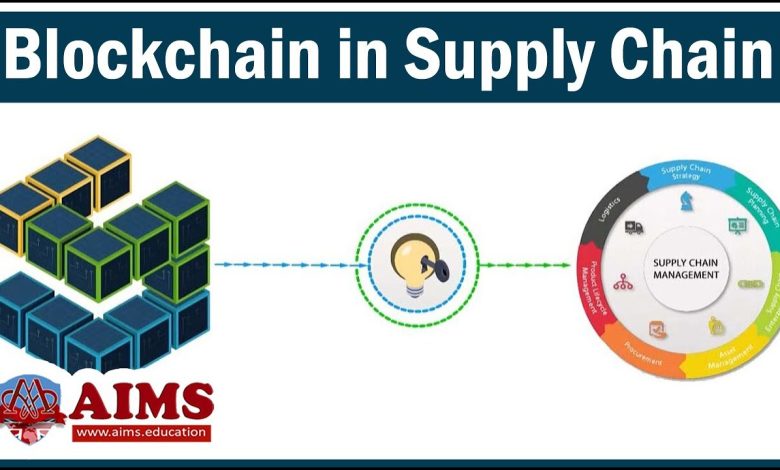The Potential of Blockchain in Supply Chain Management

- Understanding the basics of blockchain technology
- Challenges faced by traditional supply chain management
- Benefits of implementing blockchain in supply chain
- Real-life examples of successful blockchain integration
- Future trends and possibilities for blockchain in supply chain management
- Key considerations for companies looking to adopt blockchain technology
Understanding the basics of blockchain technology
Blockchain technology is a decentralized, distributed ledger system that records transactions across multiple computers in a secure and transparent manner. It is the underlying technology behind cryptocurrencies like Bitcoin, but its applications extend far beyond digital currencies. In the context of supply chain management, blockchain has the potential to revolutionize the way businesses track and manage goods as they move through the supply chain.
One of the key features of blockchain technology is its ability to create a tamper-proof record of transactions. Each block in the chain contains a unique cryptographic hash of the previous block, making it nearly impossible to alter the data without being detected. This feature ensures the integrity and security of the information stored on the blockchain, making it an ideal solution for supply chain management where data accuracy and transparency are crucial.
Another important aspect of blockchain technology is its decentralized nature. Unlike traditional centralized databases, which are vulnerable to hacking and manipulation, blockchain operates on a peer-to-peer network where each participant has a copy of the entire ledger. This distributed architecture not only enhances security but also increases trust among stakeholders by providing a single source of truth that is accessible to all parties involved in the supply chain.
Furthermore, blockchain technology enables smart contracts, which are self-executing contracts with the terms of the agreement directly written into code. These contracts automatically execute when predefined conditions are met, eliminating the need for intermediaries and streamlining the supply chain processes. Smart contracts can help automate tasks such as payment processing, inventory management, and compliance verification, reducing the risk of errors and delays in the supply chain.
In conclusion, understanding the basics of blockchain technology is essential for realizing its potential in supply chain management. By leveraging its decentralized, tamper-proof, and smart contract capabilities, businesses can create more efficient, transparent, and secure supply chains that deliver value to both customers and stakeholders. Embracing blockchain technology can lead to cost savings, improved traceability, and enhanced trust in the supply chain ecosystem.
Challenges faced by traditional supply chain management
Traditional supply chain management faces numerous challenges in today’s fast-paced and complex business environment. These challenges include:
1. **Lack of Transparency**: One of the main issues with traditional supply chain management is the lack of transparency throughout the process. This can lead to inefficiencies, delays, and even fraud.
2. **Inefficiencies**: Traditional supply chains are often plagued by inefficiencies due to manual processes, siloed information, and a lack of real-time data sharing. This can result in increased costs and slower response times.
3. **Limited Traceability**: Another challenge is the limited traceability of products throughout the supply chain. This can make it difficult to track the origin of products, leading to issues with quality control and compliance.
4. **Counterfeit Products**: Traditional supply chains are vulnerable to counterfeit products entering the system, which can have serious consequences for both consumers and businesses.
5. **High Costs**: The costs associated with traditional supply chain management can be high, due to factors such as excess inventory, inefficient transportation, and manual paperwork.
Overall, these challenges highlight the need for a more efficient and transparent supply chain management system. Blockchain technology has the potential to address many of these issues by providing a secure, decentralized, and transparent platform for managing supply chain operations.
Benefits of implementing blockchain in supply chain
Implementing blockchain technology in supply chain management offers a wide range of benefits that can revolutionize the way businesses operate. Some of the key advantages of integrating blockchain into supply chain processes include:
- **Increased transparency:** Blockchain provides a decentralized and immutable ledger that allows all parties involved in the supply chain to access real-time information. This transparency helps to reduce fraud, errors, and disputes, leading to more efficient and trustworthy transactions.
- **Enhanced security:** The cryptographic algorithms used in blockchain technology ensure that data stored on the blockchain is secure and tamper-proof. This level of security helps to protect sensitive information such as product origins, certifications, and transaction records from unauthorized access or manipulation.
- **Improved traceability:** With blockchain, each product in the supply chain can be assigned a unique digital identity that is recorded on the blockchain. This enables stakeholders to track the movement of goods from the source to the final destination, providing greater visibility and accountability throughout the supply chain.
- **Streamlined processes:** By automating manual tasks and eliminating intermediaries, blockchain can help streamline supply chain operations and reduce costs. Smart contracts, which are self-executing contracts with the terms of the agreement directly written into code, can facilitate faster and more efficient transactions between parties.
- **Better inventory management:** Blockchain technology can provide real-time visibility into inventory levels, locations, and movements, allowing businesses to optimize their inventory management processes. This can help reduce stockouts, overstocking, and other inefficiencies that can impact the bottom line.
Overall, the implementation of blockchain in supply chain management can lead to increased efficiency, transparency, security, and trust among all participants in the supply chain ecosystem. As businesses continue to explore the potential of blockchain technology, the benefits of its adoption are becoming increasingly clear.
Real-life examples of successful blockchain integration
Several companies have successfully integrated blockchain technology into their supply chain management processes, leading to increased efficiency, transparency, and security. Here are some real-life examples of successful blockchain integration:
- Walmart: The retail giant has implemented blockchain to track the movement of food products from farm to store shelves. By using blockchain, Walmart can quickly trace the origin of contaminated products, reducing the time it takes to identify and remove them from the shelves.
- Maersk: The shipping company has partnered with IBM to create a blockchain-based platform for managing and tracking shipping containers. This has streamlined the documentation process, reduced paperwork, and improved the overall efficiency of global trade.
- De Beers: The diamond company uses blockchain to provide a transparent record of a diamond’s journey from the mine to the consumer. This helps to verify the authenticity of diamonds and ensures that they are ethically sourced.
These examples demonstrate the diverse applications of blockchain in supply chain management, showcasing how the technology can revolutionize traditional processes and bring about positive changes in various industries.
Future trends and possibilities for blockchain in supply chain management
Looking ahead, the future of blockchain in supply chain management holds immense potential for transforming the way businesses operate and collaborate. As technology continues to evolve, there are several trends and possibilities that are likely to shape the landscape of supply chain management:
- Increased transparency and traceability: Blockchain technology enables real-time tracking of goods throughout the supply chain, providing stakeholders with unprecedented visibility into the movement of products.
- Enhanced security and data integrity: By utilizing cryptographic algorithms, blockchain ensures that data stored on the network is secure and tamper-proof, reducing the risk of fraud and unauthorized access.
- Smart contracts and automation: Smart contracts can be programmed to execute automatically when certain conditions are met, streamlining processes such as payments, compliance, and inventory management.
- Improved efficiency and cost savings: By eliminating intermediaries and reducing manual processes, blockchain can help companies optimize their supply chain operations and reduce overhead costs.
- Integration with emerging technologies: Blockchain can be integrated with other technologies such as Internet of Things (IoT) devices and artificial intelligence (AI) to create a more interconnected and intelligent supply chain ecosystem.
Overall, the future of blockchain in supply chain management is bright, with the potential to revolutionize the way businesses collaborate, track, and manage their supply chains. As companies continue to adopt and implement blockchain solutions, we can expect to see increased efficiency, transparency, and innovation across the entire supply chain industry.
Key considerations for companies looking to adopt blockchain technology
When considering the adoption of blockchain technology in supply chain management, companies must take into account several key factors to ensure a successful implementation. These considerations can help organizations navigate the complexities of integrating blockchain into their operations:
- Security: One of the primary benefits of blockchain technology is its high level of security. By utilizing cryptographic techniques, blockchain ensures that data stored on the network is tamper-proof and secure from unauthorized access.
- Transparency: Blockchain provides a transparent and immutable ledger of transactions, allowing all parties involved in the supply chain to have real-time visibility into the movement of goods and data. This transparency can help reduce disputes and improve trust among stakeholders.
- Efficiency: By automating processes and eliminating the need for intermediaries, blockchain can streamline supply chain operations and reduce costs. Smart contracts, which are self-executing contracts with the terms of the agreement directly written into code, can help automate tasks and enforce agreements.
- Scalability: As companies grow and expand their operations, it is essential to consider the scalability of blockchain technology. Ensuring that the network can handle an increasing volume of transactions is crucial for long-term success.
- Interoperability: To fully leverage the benefits of blockchain in supply chain management, companies should consider the interoperability of different blockchain platforms. Ensuring that different systems can communicate and share data seamlessly is essential for a smooth integration process.
Overall, companies looking to adopt blockchain technology in supply chain management should carefully evaluate these key considerations to maximize the potential benefits of this innovative technology. By addressing security, transparency, efficiency, scalability, and interoperability, organizations can position themselves for success in the rapidly evolving digital economy.



